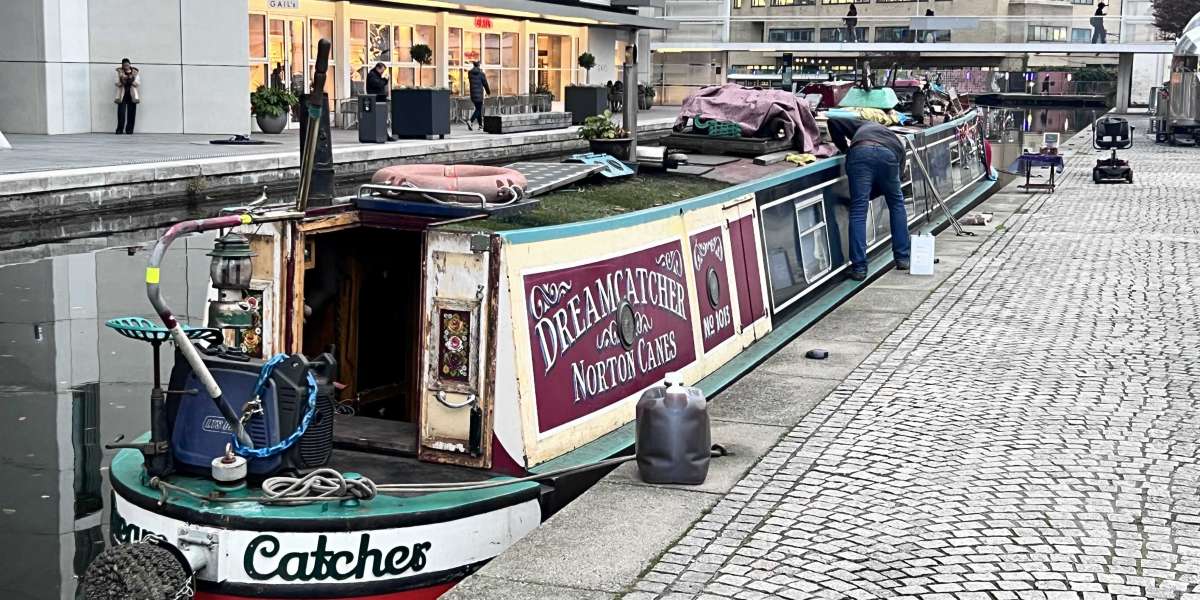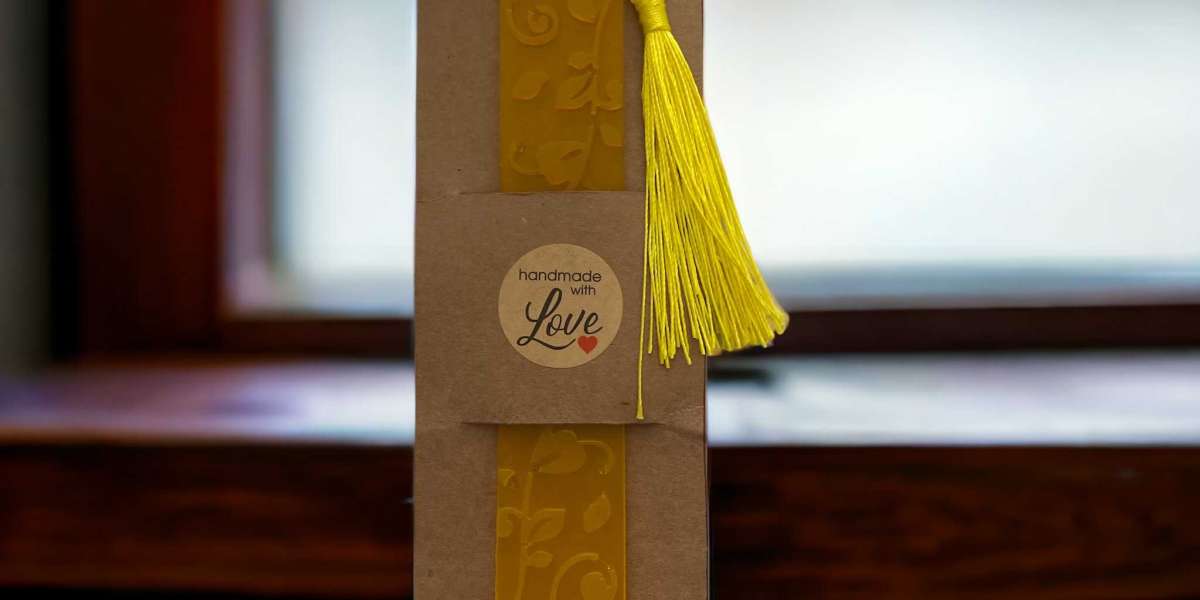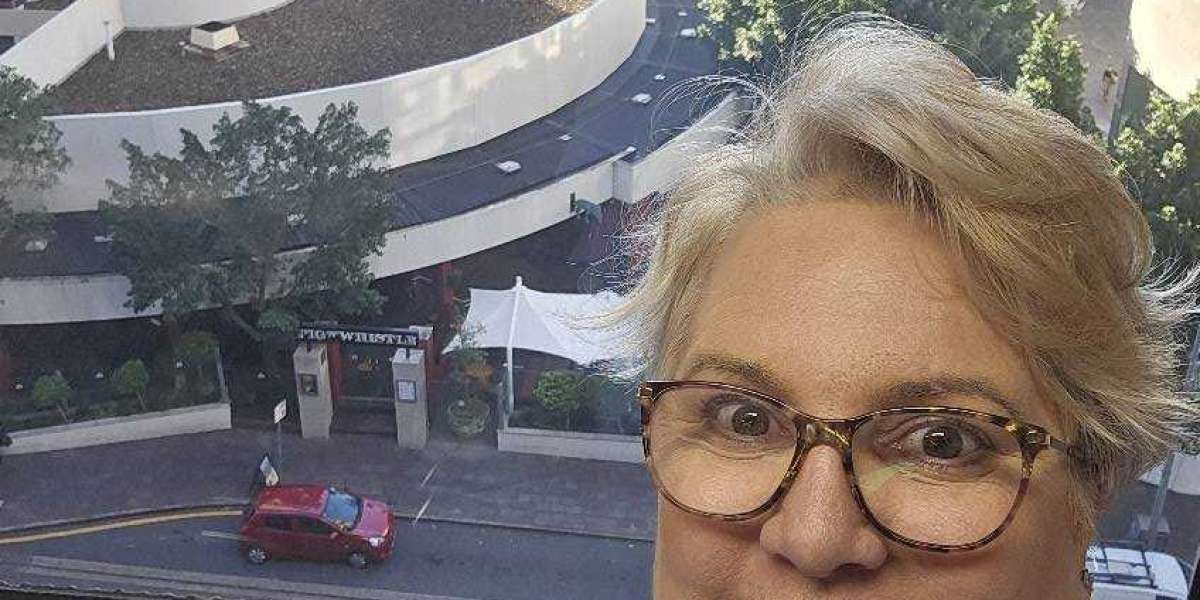It was a perfect setting for what felt like a little bit of time travel: our cozy, colourful canal boats nestled beside towering glass-and-steel skyscrapers that now dominate this part of London. The contrast between the old and the new made the day feel surreal, and somehow just right.
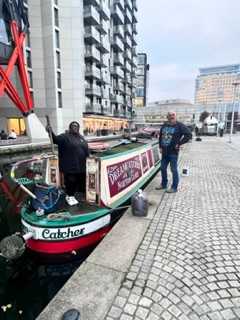
I wasn’t there just for the view, though. My friends Susie and Rainbow, who have the most vibrant personalities (and in Rainbow’s case, beard!), were there too, selling their handmade wares from the canal side. There’s something beautifully old-fashioned and honest about selling goods on a towpath. The rhythm of setting out your items, the art of arranging them to catch the eye, and the endless parade of curious city dwellers walking by, it’s a scene that feels timeless.
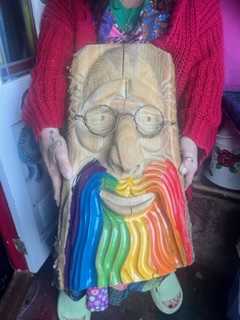
Susie’s jewellery sparkled under the muted afternoon light, while Rainbow’s signature rainbow beard and cheerful personality brought life to the display. Every time a passerby slowed down to browse or ask a question, it felt like a moment of connection, a bridge between worlds. They stopped for a glimpse into a way of life they’d maybe never encountered before. For us, the canal is home, a familiar and beloved place. But for many, it’s a mystery, one that can be easily missed among all the flash and rush of the city.
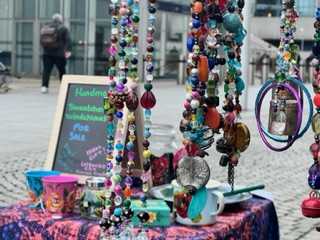
As we chatted with the people passing by, an enthusiastic group of university art students appeared, wide-eyed and brimming with curiosity. They were there on a project, they explained, and had chosen to focus on the hidden world of canal art a centuries-old tradition that many young people, especially those from urban or minority backgrounds, have never encountered. The students, in their own words, wanted to bring this “undiscovered craft” to the forefront, to make it accessible to younger generations who might not otherwise have the chance to learn about it.
I could feel my heart leap. Here were young people not just curious about canal art but truly invested in it, ready to understand the stories, techniques, and spirit behind it. The fact that they saw this craft as something worth preserving, something worth sharing with others, filled me with a deep sense of purpose. We stood around on the towpath, leaning on my boat and swapping stories, laughing, and getting into the nitty-gritty of what canal art is all about.
I told them about the history, about how canal art was born out of necessity and practicality. Early canal folk had little space to call their own, so they decorated what they could the water cans, the doors, the interior and exterior of the boats with bright colours, roses, and castles. It was a way of claiming beauty and joy in a life that was often hard and transient. They painted to make things feel like home, to add warmth to even the coldest, dampest days on the water. Some also painted to make a living.
As I spoke, I could see their excitement growing. They asked question after question, jotting down notes and snapping pictures. The idea that canal art could be an “endangered” craft seemed almost tragic to them, and it struck me that this might be one of the most rewarding things I could do with my life, to keep this art alive by sharing it with anyone who’s willing to learn.
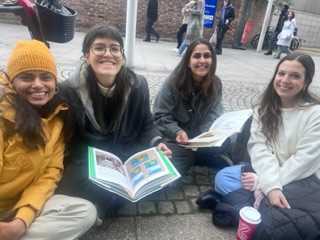
Then, as the conversation was winding down, they asked me something I didn’t expect. They wanted me to end their project with a practical lesson, to actually teach them how to paint in the style of canal art. The thought of a whole class of young people gathered around, brushes in hand, ready to immerse themselves in this tradition… well, let’s just say my heart skipped a beat. I was elated, genuinely honoured. Teaching these students wasn’t just about showing them how to paint roses and castles it was about giving them a piece of a community, a way of life, that’s too often overlooked.
I said yes, of course. How could I say no? The thought of helping them end their project with a hands on experience felt right, as if this was what I was meant to do all along. To imagine a whole class of young people, brushes dipping into paint, their faces lit up with concentration and joy, brought a smile to my face.
We ended our chat by sharing books, flipping through pages of canal art history, and pointing out techniques and styles. I could tell that this wasn’t just a one-off project for them, they were genuinely invested. Before they left, we took a few photos together, capturing the moment. My heart was so full it could burst. It was as if we had all become part of a small movement, a promise to keep the spirit of canal art alive, to let it live on in new generations.
Click here to enter the Canal Art Arty Giveaway
As the sun began to set, casting a soft glow over the glass buildings and reflecting off the water, I looked around at my friends and our little floating world. Susie and Rainbow, with their laughter and warmth, the students with their notebooks and eager expressions, the colourful boats bobbing beside us this was a community, a family of sorts, bound by a love for this endangered art and a desire to share it with others.
In the quiet of the evening, as the students walked away and we packed up our things, I felt something I hadn’t felt in a long time—a profound sense of purpose.
My little world on the water, with its old boats and vibrant art, might seem small, but yesterday, it felt like the center of the universe. I know that canal art won’t die, not if I have anything to say about it. It will continue to bring people together, to offer a bridge between the old and the new, the traditional and the modern, just as it always has.
And maybe, just maybe, a new generation will pick up the brush, step onto a canal boat, and keep this beautiful tradition alive.
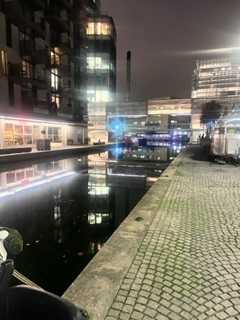
if you want to stay connected with fellow Canal Art appreciators I have a Facebook space called Rosa Lea Canal Art Gallery where I showcase my pieces and talk all thing Canal Art please come and join us @
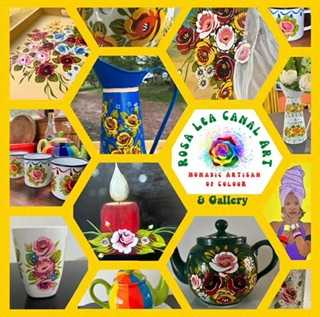
Website: www.rosaleaspaintstudio.com
Artist: Rosa Lea
Connect with Me:
Follow my art journey on social media
Come and hang out at
Let's Create Together
Join our vibrant artistic community and unleash your creativity! Visit Rosa Lea's - Art Spark ⚡️ Beginner Painters Members Lounge to be part of the conversation, share your work, and connect with fellow artists.
Why Join?
Explore new possibilities, be part of a growing Community. There's a space for you to thrive and grow.
Your Artistic Adventure Awaits
Other Blogs by Rosa Lea
*5 steps to unlocking your creative potential
*Painting Challenge Building Blocks
Social Media
F: Rosa Lea's Art Sparks Beginner Painters Lounge
